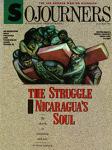While the Senate debate over John Tower captivated official Washington, a much more important event was unfolding just across town. Students at Howard University rose up to protest the appointment of Republican National Chair Lee Atwater to their school's Board of Trustees.
As many as a quarter of Howard's 12,000 students became involved in what quickly became one of the most impressive campus protests in years. The students took over the administration building and vowed to remain until Atwater was removed from the board and a number of other demands were met concerning the quality of student life and curriculum at Howard. After three days of mounting intensity and growing confrontation between the students and Howard President James E. Cheek, Lee Atwater resigned.
Howard University is one of the nation's premier black universities. It is also a bastion for black America's professional and middle class. As such, Howard must have seemed an easy and symbolically valuable target of the Republicans' new strategy for recruiting blacks to the GOP.
Atwater, the leading spokesperson for the ambitious plan, was an attractive board candidate for the potentially lucrative assistance he might provide Howard in increased federal funding, ties to conservative money, and connections in the business community. Indeed, after he was rebuffed, a very wounded-looking Atwater was making a big point of how much he could have helped Howard.
Howard was buying, but the students weren't. The administration seemed willing to forgive and forget the high cost of the last eight Republican years to the black community, the rollback of civil rights gains during the Reagan administration, "constructive engagement" in South Africa, and an ugly election campaign that featured the "Willie Horton issue" in an unmistakable Republican campaign to appeal to white voters by playing on racial fears and stereotypes.
Lee Atwater ran the Bush campaign in which Willie Horton became a household word, and the students believed that such a quick loss of memory on the part of Howard University--even if there were rewards to be gained--was below the dignity of their school and its proud tradition. In an early meeting with Atwater, concerned Howard students questioned him thoroughly on many points of Republican policy regarding issues of great importance to the black community. They were less than assured when Atwater told them how much he liked rhythm and blues!
THE HOWARD CAMPUS sits right on the edge of our own neighborhood in inner-city Washington, D.C. Howard students volunteer and work in the programs of the Sojourners Neighborhood Center. Many students are our neighbors, and we see them coming and going to class every day.
In recent years, Howard students have not been known for their protest. Most quietly go about their studies, preparing themselves for future careers and success. The protest over Atwater's appointment took almost everyone by surprise.
Some of the students even expressed surprise at themselves. Most had not been particularly politically active before. However, as they talked about their reasons for involvement, a number recalled their parents' or grandparents' involvement in the civil rights movement. One student, showing his excitement over the protest becoming national news, said, "Our parents will know." Names like Rosa Parks, Martin Luther King Jr., and Malcolm X were raised in conversations, public statements, and quotations adorning placards.
For the students, the protest was a deep matter of principle: Their university should not sacrifice integrity for financial benefit. While Howard students are the potential archetype of the upwardly mobile black professionals the Republicans are seeking to attract, in this instance at least, they refused to set aside the agenda of the black community as a whole for the sake of their more personally defined financial self-interest. Their stand and their victory have a significance beyond the boundaries of Howard University, just as surely as Lee Atwater's quiet acceptance as a board member would have.
Though Atwater and the Republicans lost an important skirmish, the battle is far from over. Issues of class, identity, and political loyalty are raging in the black community. And, as always, there are powerful white economic and political forces ready to exploit those tensions.
Ironically, Time magazine's cover line the week following the Howard protest read, "Between Two Worlds: Middle-class blacks are making it in white America--but they're paying a price." But Time got it wrong when it confidently stated, "For them [the black middle class], the passions and suffering of the civil rights struggle have culminated, as they were meant to, in the mundane pleasures and pangs of middle-class life."
That may be, in fact, what has happened in many cases, but it was not what was "meant" to be the goal of the movement led by people like Martin Luther King Jr., Fannie Lou Hamer, and Malcolm X. It was the moral, political, and economic transformation of American society, not mere assimilation into it, that was the great dream and hope of the movement's visionaries. That commitment, more than "a piece of the pie," is what inspired so many to sacrifice, suffer, and even die for freedom. While that is too often forgotten, even by former civil rights activists, it remains the living legacy of a movement we can still build on today.
For a few days in March, students at Howard University remembered some of those things and reminded the powerful and the cynical that life is more than economic rewards, and success more than personal self-interest. For that reminder, we should all be thankful and a little more hopeful.
Jim Wallis is editor-in-chief of Sojourners.

Got something to say about what you're reading? We value your feedback!
